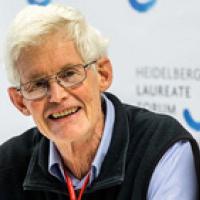
A conversation with Stephen Cook
Stephen Cook is a pioneering mathematician and computer scientist. Back when computers were still made of vacuum tubes Cook started thinking about the complexity of computer algorithms and came up with the concept of NP complete problems. Last year we had the pleasure of meeting Cook at the Heidelberg Laureate Forum and (along with other journalists) asked him questions about his work, computers more generally, and artificial intelligence. To find out what NP complete problems are, read What's your problem?. Otherwise, scroll to be below the video for a quick reminder.
You can read a transcript of the interview here.
An extremely superficial look at some complexity classes
Problems in the P class are thought of as easy (in that a computer algorithm can solve them in a feasible amount of time) and that problems in the NP class are generally thought to be harder (in that even a computer might take billions of years to solve them). NP complete problems can be thought of as the hardest problems in NP, and they are all equivalent: if you can solve one, you can solve the others too.
This hierarchy of complexity leads to one of the most famous questions in mathematics: are there problems in NP that are really harder than P ones, or is it that we just haven't found the best algorithms to solve them yet? It's know as the P versus NP problem.
A famous problem in this context is the travelling salesman problem: given a number of cities, find the shortest route that visits every city exactly once. The problem is thought to be NP-hard (at least as hard as any problem in NP), but we can't rule out that one day someone will find an optimal algorithm to solve it.